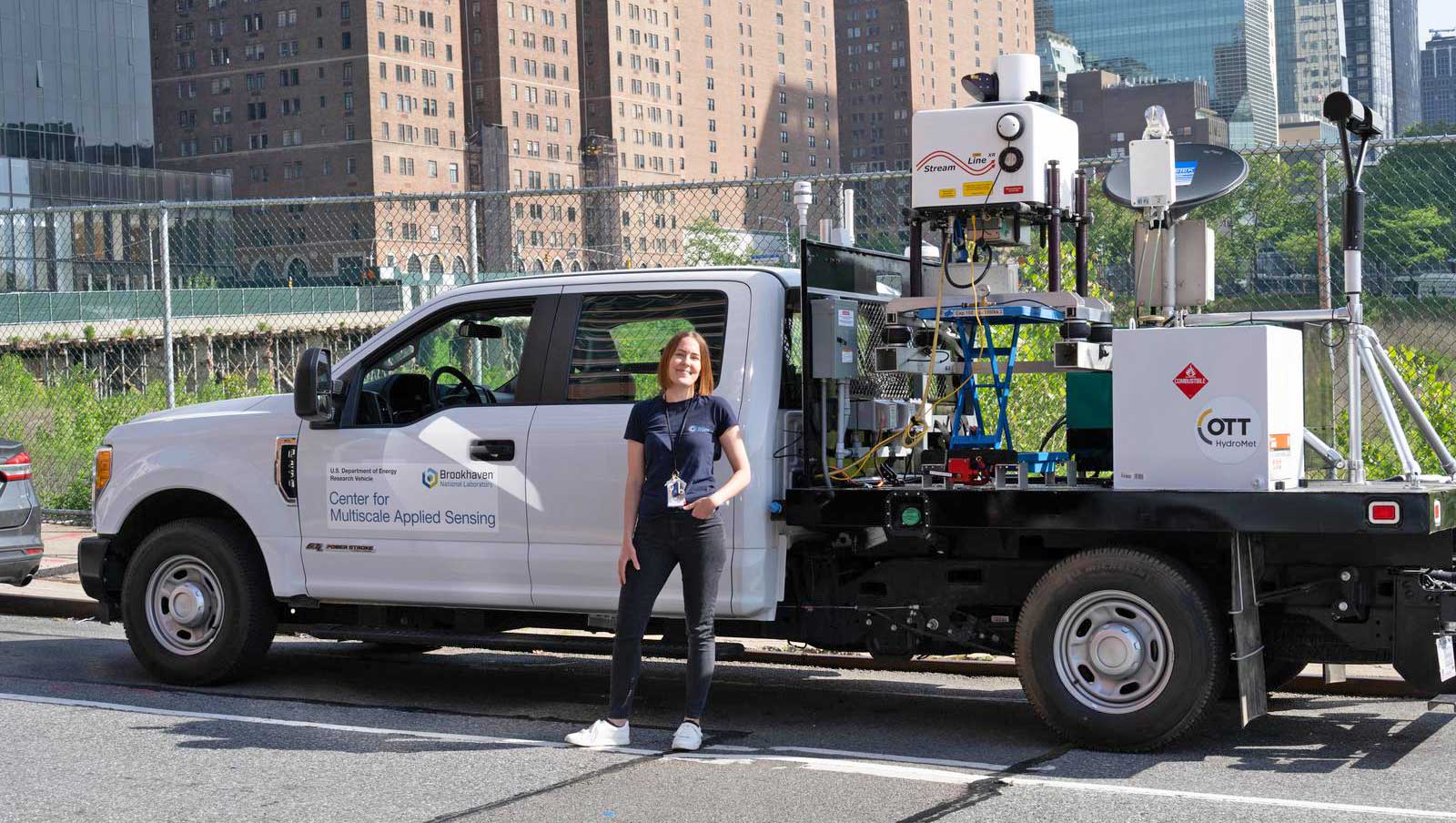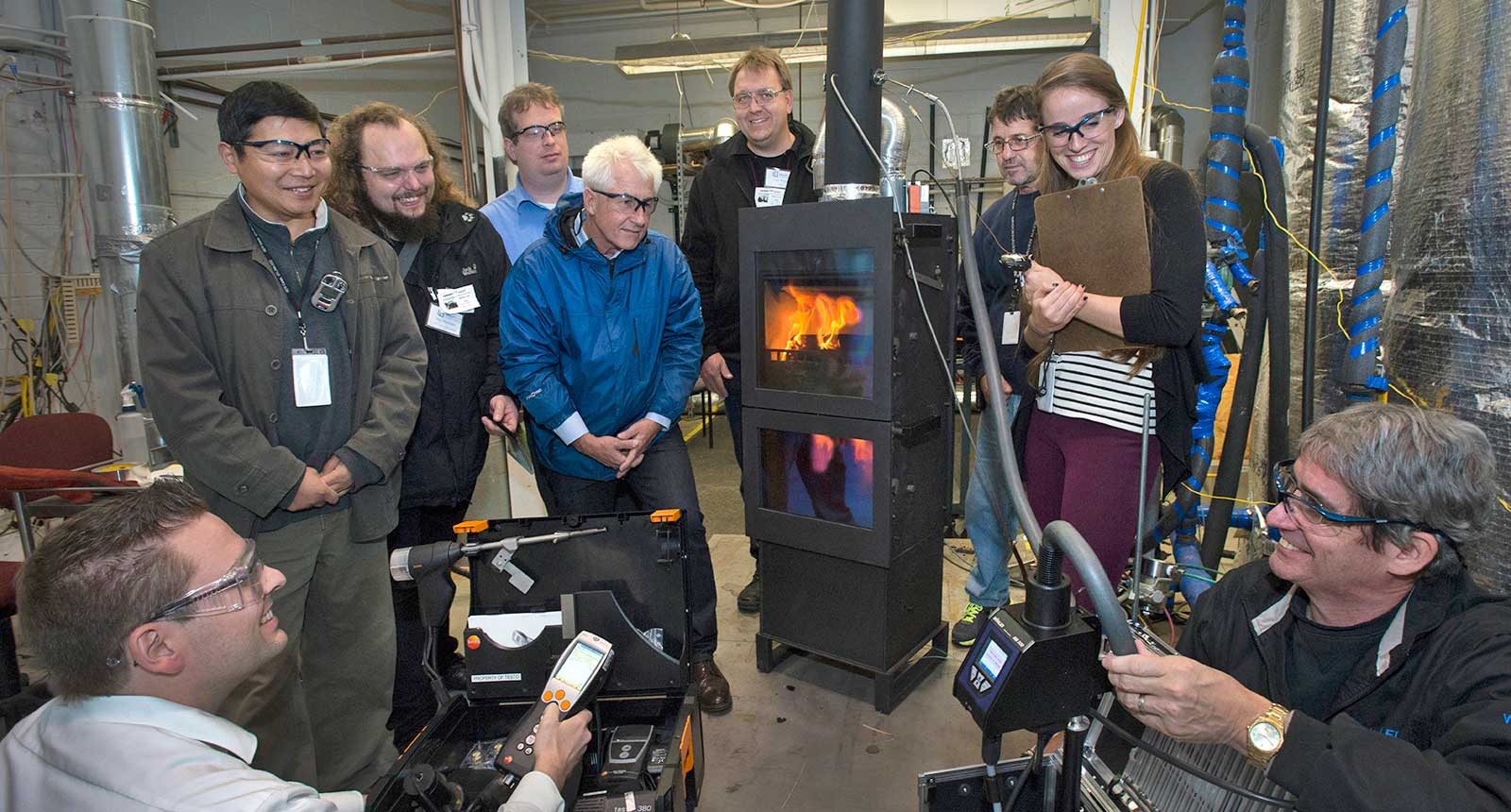
Energy Efficiency
From improving the efficiency of home heating systems to studying the dispersal of pollutants in urban areas, Brookhaven scientists are conducting research that has the potential to save money, keep carbon out of the atmosphere, and improve human health.
The urban human-Earth interface: A critical space for building a clean-energy future
Urban areas are home to the majority of the population and are also the most complex areas to understand. Under the Center for Multiscale Applied Sensing, environmental scientists at Brookhaven have developed mobile observational platforms to explore these environments in unprecedented detail. They’ve developed tools that can measure critical parameters for energy efficiency as well as the dispersion of atmospheric pollutants. With these capabilities, Brookhaven is at the leading edge of data collection that can revolutionize ultra-high-resolution models for clean air and clean energy applications.

Brookhaven's sensor-equipped truck, shown here in New York City, drives around urban and coastal areas in the Northeastern United States collecting atmospheric data. These data will advance our understanding of the hard-to-predict microclimates—local climates that differ from the climate of the surrounding area—affecting such areas.
Improving efficiency and reducing emissions from burning biomass
Direct use of wood for heat either as a main or supplemental renewable fuel is very popular across the Northern U.S. While wood combustion for residential heating plays a smaller role than other energy sources, it is a major source of fine ambient particulates in the U.S. and a major source of black carbon for sensitive Arctic regions. Brookhaven’s research has led to new test methods, now adopted by the Environmental Protection Agency, that enable more accurate characterization of emerging, cleaner biomass combustion technologies, helping to remove barriers to their market introduction. Brookhaven has also provided the technical measurement tools used in 5 national wood stove competitions that showcase cleaner and more efficient approaches for direct wood use in thermal applications.
Capabilities
- New measurement tools that will reduce cost and time barriers manufacturers face in developing new wood combustion technologies
- Mapping biomass heater performance
- Measuring standard and trace emissions
- Aerosol sampling from the flue stack or via a dilution tunnel for real-time analysis of particulate matter and gases

Wood Stove Design Challenges hosted by Brookhaven Lab focus on engaging and expanding the wood heater community and fostering relationships between academia, industry and other stakeholders to develop the most innovative wood heaters that are cleaner and more efficient. N
Innovation of small commercial and residential heating systems
Brookhaven Lab scientists have pursued a range of efforts to improve home heating systems. These include:
- Developing methods to quantify the energy savings associated with oil burner technology changes. That work accelerated the market transition to these now dominant cleaner combusting burners, ultimately saving consumers $25 billion.
- Compiling data on the benefits of transitioning heating systems to ultra-low sulfur heating oil. This effort provided major technical support to New York State’s movement to reduce sulfur by 99% in 2012, resulting in drastic reductions in particulate and sulfur dioxide emissions and significant service and efficiency benefits. All other states using liquid fuel for heating have since made similar transitions.
- Studying how to reduce greenhouse gas emissions in the heating sector through the use of a range of biofuels, including providing a technical foundation for the displacement of fossil fuels with biodiesel. Use of biodiesel blends to 20% is now very common in this market sector and the transition to higher blend levels and even 100% biodiesel is accelerating.
- Developing up-to-date, detailed methods for evaluating emissions from next-generation residential and small commercial heating and micro combined heat and power (microCHP) equipment (high efficiency water heating systems that simultaneously generate electricity). The goal is to accurately analyze the performance of current and emerging heating and power producing equipment running on today’s fossil fuels (natural gas and No. 2 oil) as well as market-ready biofuels such as biodiesel, biogas, and hydrogen.
Cold climate heat pumps for buildings
Heat pumps, powered by renewable electric power, are seen as a critical component of future, decarbonized buildings. As part of a DOE Energy Efficiency and Renewable Energy project, Brookhaven Lab is leading a team collecting data on the real-world performance of air-source heat pumps in cold climates. The project will generate high quality data on cycling patterns, efficiency, and capacity of these systems under realistic conditions. This data will help predict performance under different field conditions, identify areas where performance improvements are needed, and inform solutions meeting the challenges of integrating such systems into buildings




